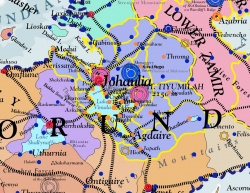Difference between revisions of "Addinoro"
Trismegistus (talk | contribs) m |
Trismegistus (talk | contribs) m |
||
| Line 22: | Line 22: | ||
*Residence of the High Priest of Atur | *Residence of the High Priest of Atur | ||
*Temple of Lord Vimal the Pilgrim | *Temple of Lord Vimal the Pilgrim | ||
| + | |||
| + | =Historic Addinoro= | ||
| + | |||
| + | ==Temple of Ten Thousand Passions== | ||
| + | Dedicated to the gods of Chaos, especially [[Lygdamion]], the Temple of Ten Thousand Passions was built during the Middle Ages of Chaos near the historic Temple of Atur. The Temple of Ten Thousand Passions was subsequently damaged by earthquake or subsidence. After the [[Isbajath of the Penitents]], 2265 to 2267, the Temple of Ten Thousand Passions was razed and the site made into open pavement in the temple district to remove the memory of its presence. | ||
| + | |||
=See Also= | =See Also= | ||
Revision as of 02:25, 10 March 2020
A principal and ancient city of Vimalia in on the shore of Lake Vimala, Addinoro is a subject city of the Republic of Johaulia and celebrated for its ancient priesthood, temples, and history. Addinoro is also the seat of a municipality in its own right. In Jathya-Dhumi, Addinoro is called Aturoksha which means "City of the god Atur". The city's namesake is thought to be the most ancient or nearly most ancient cult since it was established. Lord Atur and Lord Vimal are the two principal divinities that have been propitiated for countless millennia. Addinoro is attested in legend at least to the seventh millennium before Salmakhamer. Addinoro (Aturoksha) was the capital of the Kalaman Empire during the five dynasties of the Surizhah Kingdom, from 3042 AS to 2323 AS (about 719 years) and the five dynasties of the Tamukh Kingdom, from 2323 AS to 1884 AS (about 439 yrs). The so-called zombie plagues (2,400 AS to 2,100 AS) which arose periodically as part of the great wars between the Neptultchi empire and the Kalaman Kingdom precipitated the collapse of the Surizhah Kingdom. When the Tamukh Kingdom collapsed, Aturoksha became an independent city under the direct rule of the high priest of the Temple of Atur, during the Interdynastic Period, 1884 AS to 1729 AS (about 155 yrs). The city was renamed Addinoro during the Midretassene Period when according to legend, the demi-god, Addan slew the water dragons in Lake Vimala. The name today, Addinoro, ironically, is only used by foreigners as the locals use the ancient name. Despite this, there are several shrines to the Jathya-Dhumi version of the demi-god, Addan, in the city.
Climate
The god Atur is aptly patron of the city as it receives an abundance of rain in spring and late summer, with endless drizzles during the winter. Addinoro is among the rainiest cities of Vimalia and has a climate best described as a 'Mediterranean Rain Forest' in Earth terms. The rainy weather is attributed to the fact that Atur rests next to a large lake on the plateau of Corundy. It also receives much rainfall run-off from the northeast Damisatta Mountains as the city is perched on steep slopes on the shore of Lake Vimala. A system of small canal channels were built in ancient times to help drain the city of its nearly perpetual rainfall. Even when it is not raining over the city, water drains almost continually during the wet seasons from the Damisatta Mountains.
Dragonrail
The dragonrail lines of Addinoro were built over the small canal channels that serve to drain the city during the rainy season as the city is too densely packed with buildings and many narrow streets.

Government
Aturoksha is a principal city, third in precedence in the Republic of Johaulia, and chief city of its local jurisdiction.
Sites
- Ancient Philosophical College of Aturoksha
- Aturokshan School of the Beautiful Arts
- Great Temple of Atur
- Residence of the High Priest of Atur
- Temple of Lord Vimal the Pilgrim
Historic Addinoro
Temple of Ten Thousand Passions
Dedicated to the gods of Chaos, especially Lygdamion, the Temple of Ten Thousand Passions was built during the Middle Ages of Chaos near the historic Temple of Atur. The Temple of Ten Thousand Passions was subsequently damaged by earthquake or subsidence. After the Isbajath of the Penitents, 2265 to 2267, the Temple of Ten Thousand Passions was razed and the site made into open pavement in the temple district to remove the memory of its presence.
See Also
| This article is a stub. It requires further development by the creator. |

